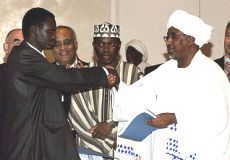One year after, Darfur peace marks progress despite flaws
May 5, 2007 (KHARTOUM) — On the occasion of the first anniversary of signing the Darfur Peace Agreement (DPA), observers praised on Saturday progress achieved in its implementation despite of flaws and difficulties.
 On May 5 last year, the Sudanese government signed the African Union-sponsored DPA with a faction of the rebel Sudan Liberation Movement (SLA) in Nigerian capital Abuja in the presence of mediators from the U.S., Britain and a number of African countries.
On May 5 last year, the Sudanese government signed the African Union-sponsored DPA with a faction of the rebel Sudan Liberation Movement (SLA) in Nigerian capital Abuja in the presence of mediators from the U.S., Britain and a number of African countries.
“Although the DPA has not been termed by us at any time as perfect, but it constitutes a solid base for a solution which will meet the basic demands of all the parties,” said Nouraddin Mazeni, the official spokesman of the African Union Mission in Sudan (AMIS).
“Besides different interpretations of the peace agreement, an interaction of internal, regional and international elements have slowed down its implementation,” the AMIS spokesman told Xinhua.
After the signing of the DPA, a retrogradation of violence has been witnessed in the western Sudanese region, but the unstable situation in the region is still attracting attention of the world and calling especially for humanitarian efforts.
Minni Arkou Minawi, the only rebel leader who has signed the DPA, urged the non-signatories to take on the peace train and sign the peace agreement so that the Darfurians could avoid more sufferings.
“The ball is now on the court of the (rebel) factions which have not signed the DPA, ” Minawi told Xinhua in Al Fasher, capital of North Darfur State, adding that this year would be “decisive” for the implementation of the peace agreement.
After signing the DPA, Minawi was sworn in at a magnificent ceremony in Khartoum in August last year as the senior presidential assistant and the chairman of the Transitional Darfur Regional Authority (TDRA).
On March 24, an armed clash erupted in a crowded residential area in Khartoum between the police and a group of SLM members, leading to the killing and wounding of dozens of persons on the two sides.
However, this bloody incident has not prevented the two peace partners from implementing some urgent items of the DPA.
Last week, the TDRA headquarters was opened in Khartoum, and its branches were inaugurated in the three states in Darfur.
On the field situation in Darfur, sporadic fighting have repeatedly taken place in the past year between various armed groups, particularly by tribal militants, besides attacks on humanitarian personnel.
Local analysts believe that the biggest obstacle for the resumption of the peace negotiation is a disruption of the rebel movements and an incompatibility of their positions.
On Thursday, Sudan signed a reconciliation accord with Chad, which Khartoum had accused of backing the Darfur rebel movements in the past years.
In the accord, signed by Sudanese President Omer al-Bashir and his Chadian counterpart Idriss Deby in Saudi Arabia, the two countries pledged to cooperate with the United Nations to stabilize Sudan’s Darfur region and the neighboring areas of Chad.
Welcoming the Sudanese-Chadian reconciliation accord, Mazeni stressed that it was “an extremely important element in view that a mutual approach between the two countries will have positive effects” on the Darfur peace process.
He hoped that an end of the Darfur crisis would be achieved in 2007.
(Xinhua)
